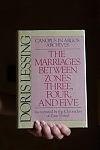
Doris Lessing
The Marriages Between Zones Three, Four and Five
Canopus in Argos: Archives, Book Two
The Marriages Between Zones Three, Four and Five is as Doris Lessing herself once said, “pure myth.” This book takes archetype man and archetype woman and combines them with a conjugal order. The subconscious messages of the Providers thus ordained, made themselves known in consciousness. Miscommunication, misunderstanding, frustration followed; there came a baby, love; ordained separation and another marriage.
This book was written in the vein of myth-making, legend or lore. The Marriages Between Zones Three, Four and Five followed Shikasta into “space-fiction”: “I feel as if I had been set free both to be as experimental as I like, and as traditional: the next volume in this series, The Marriages Between Zones Three, Four and Five, has turned out to be a fable or myth. Also, oddly enough, to be more realistic.” The book is not as much set in starry realms as it is set in imagination. The Zones like the realms of my mind, climbing higher, “Through the pass, there we must pass, and gather in the blue.”
Al·Ith was once the queen of Zone Three, which buzzed with permissive harmonies. Ben Ata was once the king of Zone Four, which roared with the grinding war machine though there lacked a war. “Pompous discipline and lack of subtlety in relationships” was what Al·Ith was forced to marry. She rode into Zone Three bareback and defiant, though submissive to what she was summoned to do. She saw Ben Ata with his bare hairy legs and his sweaty ruddy face and was disgusted. He saw her in her plain elegant way and was disgusted. Their relationship ebbed and flowed, reached some agreements sometimes as to what the other was like, until, one day they truly became one with the other. The drum stopped beating. Al·Ith rode away with her dark hair flowing, her tears streaming.
Such is the book half finished. Wherein the impossible sadness of Al·Ith’s situation throbbed in me for I was sure sadness was this book’s most striking part. Not only the sadness of the severed relationship but a timeless, unresolvable sadness, the kind always there for it bubbles up, the sadness of the world. It was as if misunderstanding between all Zones was Al·Ith’s cross to carry. When she returned she found that her home Zone no longer welcomed her; Al·Ith had to keep moving, she had to go somewhere else. Al·Ith fled to the fringes between Zone Two and her own, where the flames of the unknown Zone burned blue within her.
Misunderstanding between the sexes; misunderstandings between “different” places and “different” peoples. The stunning disbelief Al·Ith felt when in Zone Four for the first time, the shattering inability of understanding Ben Ata displayed when he came face to face with Al·Ith is not anything unusual. The two may as well have been speaking another language. Sure, it happens all the time. But what is lost? At what cost?
We know the answers in how Ben Ata has changed near the end of the book, how he listens and how he thinks. Who Al·Ith has become, the pariah, driven out of her own land and drawn consequently to another. The Zones lose their boundaries and people crossed between them. People, sexes and places flowed freely.
The Marriages Between Zones Three, Four and Five has almost nothing to do with its predecessor, Shikasta, only in that into the ground-work of “space-fiction” was set possibilities. The traditional element in this book, the aura of myth or legend, lends its timeless air and also spawns the momentum which is Doris Lessing’s climb up sprawling imagination. With such stories, their feeling comes easily, I assume as to the reader and to the writer. As Doris Lessing herself says about Marriages: “This book goes right down into me pretty deep.”
In the interviews, Putting the Questions Differently, Doris Lessing continuously expresses her passion for this book. “Something happened when I wrote the book. I hit some other level. And is it a legend or a myth or a fairy tale or a fantasy? That isn’t the word for what I’ve written, I think. You see, only I could have written The Golden Notebook, but I think Anon wrote this other book.” Timeless, boundless, this was book like a rare burning beauty freely flowing.
· · · · · · · · · · · · · · · · · · · ·